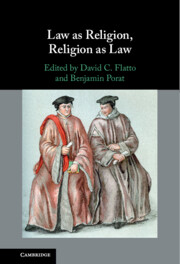The conventional approach to evaluating the relationship between law and religion operates on the assumption that these are discrete domains that often compete, and at times even clash, with one another. This orientation animates scholarship and public discourse on such salient topics as mediating between church and state; balancing freedom of religion and freedom from religion; weighing the alternate commitments of religion and human rights; and delimiting the respective jurisdictions of civil and religious courts.
A dichotomous paradigm, however, is not the only way to conceptualize the intersection between law and religion. The “Law As Religion, Religion As Law” volume explores a different perspective that has emerged in recent scholarship which regards law and religion as overlapping frameworks that structure the lives of individuals as well as the social order. From this vantage point, law and religion arguably share similar properties, and may even have a symbiotic relationship. Moreover, many legal systems exhibit religious characteristics, informing their notions of authority, precedent, ritual and canonical texts, and most religions invoke legal concepts or terminology (this phenomenon is especially evident in the thick normative traditions of the Abrahamic religions). This suggestive blurring of categories pervades the wide-ranging chapters that comprise this volume.
By exploring manifold interconnections between religion and law, the chapters of the “Law As Religion, Religion As Law” volume participate in, and contribute to, several influential discourses that are ongoing in the academy and the public square.
One is the surge of interest in political theology, a mode of inquiry that critiques secular liberal political theory and posits that certain modern sovereign powers and principles derive from, or replace, theological institutions or doctrines. Recent studies by Paul Kahn, Mark Lilla, and Seyla Benhabib have evaluated this claim in the political domain,Footnote 1 and Harold Berman, Steven Smith, and Jeremy Waldron have focused on analogous themes in the legal sphere.Footnote 2 In a critical essay surveying this growing field, Cecile Laborde argues persuasively that political theology forces commentators to think harder about the category of religion.Footnote 3 This volume contains penetrating studies that honor this call by reevaluating the nexus between religion, law, and politics from a plurality of perspectives that lend new depth to this inquiry.
A second, related, scholarly discourse on secularism has challenged the Weberian account of modernity as a period of growing disenchantment. Indeed, political and empirical developments of the past decades have further unsettled long-held predictions about the waning of religion. Employing the lenses of anthropology, philosophy, sociology, and history, scholars have instead considered the manner in which secularism is itself a constructed category (see, e.g., the works of Asad, Taylor, Berger, Cavanaugh, as well as the more recent studies of Copson and Crane).Footnote 4 By revisiting and complicating the categories of “law” and “religion,” and their presumptive connotations in a “secular age,” from an analogously broad range of disciplines, this volume adds critical texture to these arguments.
A third relevant discourse relates to contemporary approaches to church and state. Certain scholars have presented trenchant criticisms of traditional paradigms (Laborde, Shakman Hurd, Mahmood)Footnote 5 or called for important revisions of leading church-state doctrines (Eisgruber and Sager, Greenawalt).Footnote 6 Some have promoted greater integration of religious minorities into the public square, but this has also evoked concerns about the vexing social challenges that this would precipitate. For instance, Michael Ignatieff has expressed skepticism about whether liberal polities can find ways to accommodate religious legal traditions within the larger normative order.Footnote 7 Not discounting the formidable hurdles that may be encountered, such a rejoinder presupposes certain narrow or rigid definitions of law and religion. The studies in this volume thus suggest significant modifications worth considering in this regard.
Finally, a number of recent pioneering works in the field of religious studies have addressed the foundational theme of divine law. In a sweeping study that relates to facets of medieval Judaism, Christianity, and Islam, Remi Brague presents a religious-philosophical analysis of the idea that norms which guide human actions are ultimately rooted in the divine realm.Footnote 8 A subsequent work by Christine Hayes returns to antiquity, where conceptions of divine law were first formulated and proved to be highly consequential.Footnote 9 Surveying a substantial body of early Greco-Roman and Jewish-Christian literature, Hayes identifies two contrasting paradigms of divine law. Both of these works, which are panoramic in scope, invite subsequent research into particular aspects of religious legal traditions, and the ways they navigate the tension between religion and law. In this vein, this volume offers discrete studies that add greater resolution and important nuance to these broader accounts.
The numerous chapters that comprise this volume implicate all of these discourses, either directly or indirectly, and advance them forward by employing multidisciplinary perspectives, evaluating specific case studies and engaging in analyses that straddle the ancient and modern periods.
This volume represents the culmination of a two-year research project that was convened at the Hebrew University dedicated to exploring new perspectives on law and religion, which included numerous workshops and an international conference. Leading scholars who participated in this project have contributed original chapters to this volume exploring “Law As Religion, Religion As Law” from a range of perspectives, religions and cultures, time periods, and subject matters.
This book benefited from the continual guidance of the outstanding editorial team at Cambridge University Press, led by Matt Gallaway, as well as Jane Bowbrick, Cameron Daddis, Akash Datchinamurthy, Jadyn Fauconier-Herry and Helen Kitto. We also wish to thank Gadi Haber, Rotem Sapir-Jacobs, and Elisheva Finkelman for their excellent assistance in preparing the manuscript for publication. Finally, we wish to thank the Aharon Barak Center for Interdisciplinary Legal Research for its generous financial support of our research project and the production of this volume.



